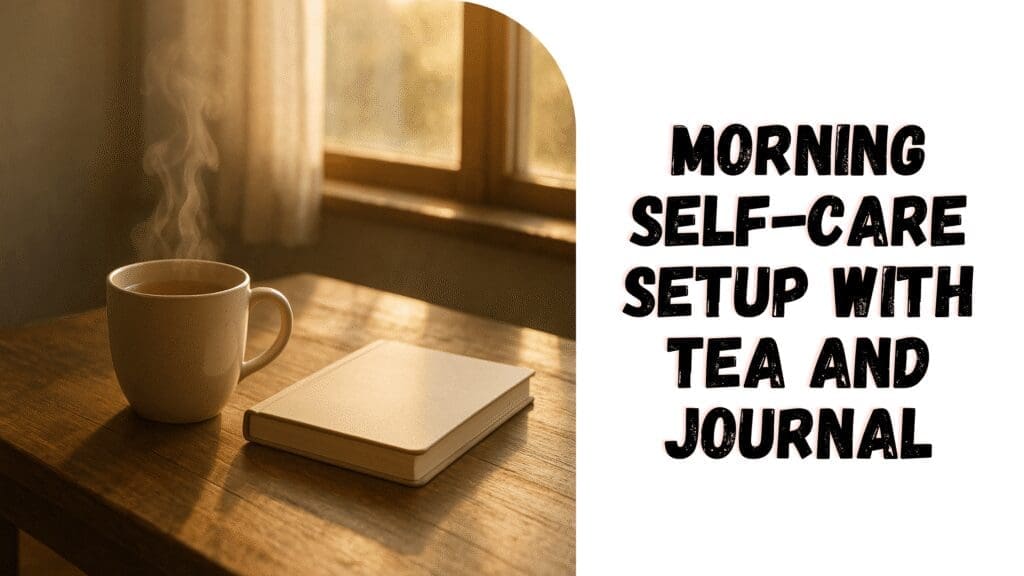
Table of Contents
Powerful Morning Self-Care Habits for a Better Day
Self-care has become a common phrase for many, but even more people feel they do not have time for self-care. It can also be seen as a luxury that we will try and fit into our busy schedules when things settle. However, things never seem to settle.
What is self-care?
According to the NHS (National Health Service in the UK), self-care consists of actions and activities people can undertake to maximise their physical and mental wellbeing.
Why is self-care important?
Self-care is important because we are living increasingly busy lives, it is becoming harder to switch off and more people are feeling burnt out than ever. Self-care practices reduce anxiety, stress and can decrease your risk of becoming unwell. Self-care also increases resilience, self-worth and improves your physical health.
The Power of Your Morning Routine
How many times have you woken up, got ready and then headed straight into your day and then by 2pm realised you haven’t eaten or even gone to the toilet? Often we wake up and then our day is hijacked by other people’s agendas. By the evening, we are exhausted physically and mentally, and we binge watch our favourite TV show while eating high fat, high sugar, ultra- processed foods. Then we wonder why we wake up exhausted but then we repeat the day over and over again. Never feeling better and gradually feeling worse each day.
As a busy mum of four children, the quiet time in the morning before everyone wakes up is my golden hour. It’s quiet, no-one is shouting (or texting) “mum!” every 5 minutes and I can focus on my own needs and wellbeing. There are many opinions about what time you should wake up in the morning, but I don’t think that one size fits all. Depending on what my clients want to include in their morning routine I will advise them to set their alarm for 20-60 minutes before anyone wakes up. This way they can guarantee not to be disturbed, and they can truly focus on their own needs.
How to Design a Morning Routine That Works for You
There are many things that you can include in your morning routine.
Here are some self-care ideas to include:
- A 10-minute Meditation or mindfulness practice
- A 5–15-minute stretch session
- A faith-based activity such as reading a religious text and praying.
- Planning your day. (Setting your own agenda first before other’s needs take over)
- Reading a book with a cup of tea (or drink of your choice)
- Journalling
- Exercise
- A gratitude practice
- Listen to a podcast
- Take an early morning walk or sit in your garden
- Sitting in peace and being fully present with a cup of coffee or drink of your choosing
My Personal Morning Routine
My morning routine starts the evening before. I stop drinking caffeine at around 3pm. I will also plan the next day using The Productivity Planner® by Intelligent Change. This planner has helped me so much with reducing procrastination and increasing my productivity.
By planning my day, the evening before, when I wake up I already know a rough plan of the day and the tasks I need to accomplish. I am in bed by 11pm as I usually wake up between 5:30am-6:30am naturally no matter what time I go to sleep. This works well as my eldest children wake up at around 6:30am to get ready for school.
Since being diagnosed with Multiple Sclerosis, I take my sleep very seriously and try to keep my sleep routine consistent, though there will obviously be the times when I go to bed later due to an event or occasion.
When I wake up I do not touch my phone straight away. There may be apps I use for my meditations or other aspects of my morning routine, but I do not go into my emails or messages until I have completed my morning routine or later in the morning, after breakfast.
When I wake up, I lie in bed and have a moment of gratitude that I woke up at all. I have had relatives who were not so lucky. My sister and brother-in-law went to sleep and did not wake up, and I know firsthand how fortunate I am to be able to open my eyes on a brand-new day. I have a clock on the wall, so I do not need to touch my phone to know the time (if I wake up before my alarm clock).
It has taken me about 2 years to lock down a consistent and easy morning routine. In the past, I have tried to make things too complicated or tried to include too many things, and it became stressful.
My morning routine always consists of:
- Reading the relevant entry from The Daily Stoic. This book by Ryan Holiday and Stephen Hanselman gives daily short pearls of wisdom from Stoic philosophy. This helps to get me into the right mindset for the day by increasing self-awareness, resilience and inner peace.
- I do a faith-based activity, such as reading the bible and praying.
- I do a meditation or a mindfulness exercise. I change it up, but I have a few apps and practices that I use, depending on how I’m feeling.
- Using The Productivity Planner®, I write down at least 3 things I am grateful for and set an intention for the day.
- I then go through my tasks and schedule for the day that I planned the evening before.
- Then I just have a moment where I close my eyes and do some deep breathing for 2-5 minutes and then I start my day.
My morning routine may also include:
- Journalling
- A stretching session
- An exercise session
- Having a herbal tea, coffee, or tea in the garden in my dressing gown.
Final Thoughts
My aim is to be consistent and not perfect. My aim is to improve my well-being and not decrease it by making my morning routine too cumbersome or stressful. I do not get upset if I miss a morning or if I don’t manage to do all the activities. This routine makes such a difference to my day. It makes me feel like I have a protective shield around me that guards me against overwhelm, excessive worrying and negative situations.
If incorporating self-care into your life feels like an uphill struggle, then book a discovery call with me and we can work together to create a self-care routine that is easy and helps you to thrive.
References
- NHS on Self-Care: https://www.nhs.uk/live-well/self-care/
- The Productivity Planner® by Intelligent Change: https://www.intelligentchange.com/products/the-productivity-planner
- The Daily Stoic by Ryan Holiday
THANK YOU
Thank you for reading our article. Recognising the importance of your health is a powerful first step, and we’re here to support you with reliable information.
Explore our collection of blog posts for more insights on health, wellness, and other topics that inspire and inform. We aim to create content that keeps you engaged and motivated on your journey.
Disclaimer: Our blogs are for informational purposes only and do not replace professional medical advice. Please consult your doctor for personalised guidance.






















































0 Comments